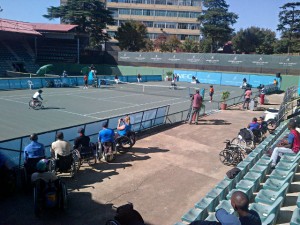The UN and partners are in a race against time to provide life-saving assistance to people fleeing escalating violence in Anbar, particularly around the battle for Fallujah.
On 5 June, UNICEF, the World Food Programme (WFP), the International Organization for Migration (IOM) and the World Health Organization (WHO) travelled to a series of camps established to receive people escaping the violence.
In the past 10 days, approximately 10,000 people have come to these camps to seek safety and services. An estimated 50,000 people remain trapped in the city as the military offensive continues.
The Government of Iraq had established a number of camps for the 60,000 people already displaced in Anbar, and in anticipation of movement from the Fallujah area. These facilities are overstretched, with little capacity to absorb more people.
Residents in Fallujah have been living with extreme levels of violence and humanitarian actors have not been able to reach them for nearly a year. In addition to violence, residents have to cope with acute shortages of food, medicine and other basic services, such as water supplies, with no way to leave the city.
The joint UN mission found people sheltering in tents or huddled in whatever shade they could find to escape the searing heat and blowing dust. Most people fled with just their clothes, and many families had been separated from male members who were undergoing screening.
One woman approached the mission team members and asked for help, saying: “We came with nothing, we have nothing” – which characterizes the situation of thousands of other people in the camps.
The UN and partners are spearheading a joint rapid response that provides safe drinking water, food rations, and hygiene and sanitation assistance to families. Safety is also a major concern, given that the front lines are just several kilometres from the camps.
The UN expects the conflict to escalate and with that more people to be displaced.
The UN appeals to all parties to the conflict in Iraq to protect families and provide those affected by the violence free and safe access away from the conflict.
As a result of escalating violence in the past two years, more than 3.4 million people are now displaced all over Iraq, more than half are children.
Across the country, more than 10 million people need lifesaving humanitarian assistance. UNICEF, WFP, WHO and IOM, along with other partners in Iraq, reiterate the need for urgent additional funding to provide uninterrupted life-saving humanitarian operations.
The Humanitarian Response Plan for Iraq has a funding gap of over US$550 million.








